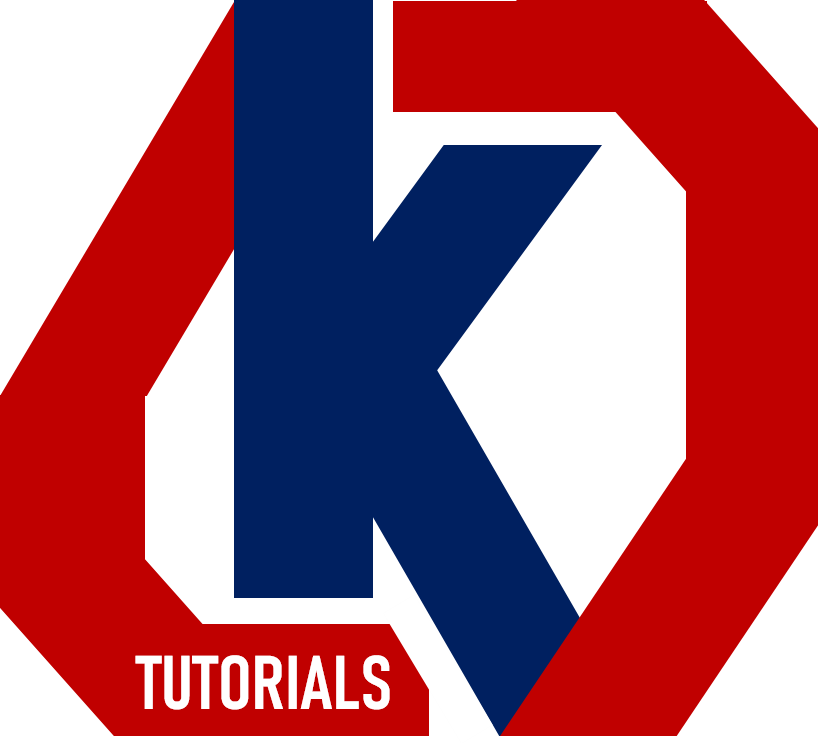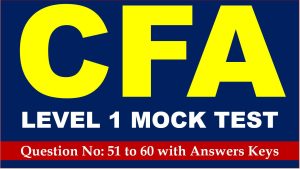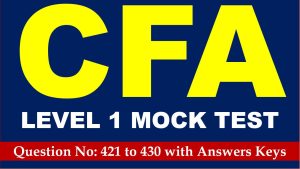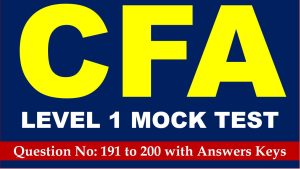Hi CFA Aspirants, welcome to AKVTutorials. Are you preparing for CFA Level 1, 2, 3 exams for making a career in CFA (Charted Financial Analyst). According to CFA Wikipedia, CFA The Chartered Financial Analyst (CFA) program is a postgraduate professional certification offered internationally by the American-based CFA Institute. A candidate who successfully completes the program and meets other professional requirements is awarded the “CFA charter” and becomes a “CFA charter holder”. Therefore, you need CFA Study Notes and Free CFA Practice Test 18 Questions Level 1 Answer Keys AMBIPi
In this article, you will get Free CFA Level 1 Mock Exam Practice Questions.
Free CFA Level 1 Mock Practice Exam Questions Bank
Free CFA Level 1 Practice Question No: 171:
According to Standard IV (B.4), Priority of Transactions, a member is a “beneficial owner” if the member has each of the following, EXCEPT:
Option A : the power to vote or direct the voting of the shares of the securities or investments.
Option B : the power to dispose or direct the disposition of the security or investment.
Option C : the authority to supervise reasonably and adequately the actions of those accountable to him.
Option D : a direct or indirect pecuniary interest in the securities.
Show/Hide Answer
Option C : the authority to supervise reasonably and adequately the actions of those accountable to him.
The authority to supervise those below the member has no relation to the concept of “beneficial owner.” Also, supervisory responsibility is covered under Standard III (E).
CFA Level 1 Exam Question No: 172:
According to Standard IV (B.7), Disclosure of Conflicts, the most prevalent conflict pertains to _______.
Option A: members’ ownership of stock in companies they recommend.
Option B: broker-sponsored limited partnerships formed to invest venture capital.
Option C: service on a board of directors.
Option D: none of these answer
Show/Hide Answer
Option A : members’ ownership of stock in companies they recommend.
Under Standard IV (B.7), Disclosure of Conflicts, the most prevalent conflict pertains to members’ ownership of stock in companies they recommend. To avoid discrimination against members, sell-side members should disclose any materially beneficial ownership interest in a security or other investment that the member is recommending. Buy-side members should disclose their procedures for reporting requirements for personal transactions.
Free CFA Level 1 Mock Exam Question No: 173:
Various countries’ securities laws permit a manager to pay up for goods and services without violating the manager’s fiduciary duty, so long as the requirements of the law are followed. Each of the following are typical requirements, except:
Option A: the manager’s soft-dollar practice must be disclosed.
Option B: the manager may seek satisfactory price and execution.
Option C: the goods or services purchased must be for “research service.”
Option D: none of these answers.
Option E: the commission paid must be reasonable in relation to the research and execution services received.
Show/Hide Answer
Option B : the manager may seek satisfactory price and execution.
The manager must seek BEST price and execution.
CFA Level 1 Free Practice Question No: 174:
Monserrat Troy is a portfolio analyst at Merryl Flynch Inc., a leading investment bank. Merryl’s corporate policy prohibits its employees from trading in IPOs even if they are not being underwritten by Merryl. Recently, a fast-growing internet firm, Netblaze, announced that it was going public. Monserrat’s friend, Victor, told her that he could get her bid in for a few shares of the IPO. The size of the deal was very small, amounting to less than a couple of thousand dollars. Monserrat went ahead and bought the shares but did not think it was necessary to inform her supervisor about it. She:
Option A: violated Standard II (B) – Professional Misconduct – by violating company policy.
Option B: did not violate the AIM code of conduct even though she violated the company policy since the size of her transaction was extremely small.
Option C: violated Standard III (B) – Duty to Employer – by violating company policy.
Option D: Violated Standard III (C) – Disclosure of Conflicts to Employer – by violating company policy.
Show/Hide Answer
Option D : Violated Standard III (C) – Disclosure of Conflicts to Employer – by violating company policy.
Merryl’s policy is designed to prevent any conflicts or even appearances of conflicts of interest when its employees trade in capital markets. If Monserrat wants to trade in a particular IPO, she needs to obtain special permission from Merryl’s Compliance department (and such permission may or may not be granted by Compliance). Without such an exception, Monserrat’s behavior is a violation of Standard III (C)
– Disclosure of Conflicts to Employer. Note that Standards II (B) and III
(B) do not apply to this situation.
Free CFA Practice Question No: 175:
When an investment manager’s client instructs the manager to use the client’s brokerage to purchase goods or services for the client, this is known as:
Option A: horizontal brokerage and does not violate any fiduciary duty.
Option B: horizontal brokerage and violates the manager’s fiduciary duty.
Option C: directed brokerage and does not violate any fiduciary duty.
Option D: straight brokerage and does not violate any fiduciary duty.
Option E: straight brokerage and violates the manager’s fiduciary duty.
Option F: directed brokerage and violates the manager’s fiduciary duty.
Show/Hide Answer
Option C : directed brokerage and does not violate any fiduciary duty.
When an investment manager’s client instructs the manager to use the client’s brokerage to purchase goods or services for the client, this is known as directed brokerage. Because brokerage is an asset of the client and the brokerage is used to benefit that client, not the manager, such practice does not violate fiduciary duty.
CFA Level 1 Sample Question No: 176:
Under the AIMR Code of Ethics, members shall practice and encourage others to practice in a professional and ethical manner that will reflect credit on members and their ______.
Option A: families.
Option B: employer.
Option C: public contacts.
Option D: profession.
Option D: none of these answers.
Show/Hide Answer
Option C : public contacts.
In accordance with the Standards, members will also strive to maintain and improve their competence and the competence of others in the profession,
Free CFA Level 1 Quiz Question NO: 177:
The value of a real estate portfolio requires, at minimum, ________ review.
Option A: weekly.
Option B: quarterly.
Option C: daily.
Option D: monthly.
Option E: annual.
Show/Hide Answer
Option D : monthly.
The practice of providing quarterly reports satisfies the quarterly review requirements. The issuance process should include a review of the real estate portfolio, a review of net asset value for financial and performance purposes, and review and disclosure of any factors that might result in a material change to net asset value.
Free CFA Level 1 Quiz Question NO: 178:
Which of the following are mandatory disclosure requirements under AIMR-PPS?
I. The number of portfolios and assets in each composite.
II. The fees deducted or not deducted from the calculations of returns.
III. The volatility of the aggregate composite return.
IV. Benchmarks that the composites are expected to track.
Option A: I only.
Option B: I and II only.
Option C: I, II and III only.
Option D: III and IV only.
Show/Hide Answer
Option B : I and II only.
(III) & (IV) are recommended disclosures while (I) and (I1) are mandatory.
Free CFA Practice Question No: 179:
Paul Erdosh is an independent contractor who was hired by Arbitrage Securities to carry out a research project involving the software industry. The scope of the research was broad and the aim was to identify relatively undervalued stocks in that sector. During the course of the research, Paul realized that two of the companies in the sector were prime takeover targets if anyone bothered to do more research on them. He decided to sell this finding to M&A Consultants and obtain a research contract from them. He did not inform Arbitrage Securities about this deal, though he did submit a competent research report on the software industry to them. Paul has
Option A: not violated Standard I B) – Duty to Employer.
Option B: violated Standard III (B) – Duty to Employer – because by selling the information to a rival firm, he has potentially harmed Arbitrage Securities’ business.
Option C: not violated Standard III (B) – Duty to Employer – because he is an independent contractor, not an employee of Arbitrage Securities.
Option D: violated Standard III (B) – Duty to Employer. He needs written permission from Arbitrage Securities before releasing any of his findings to third parties.
Show/Hide Answer
Option A : not violated Standard I B) – Duty to Employer.
Arbitrage Securities hired Paul to do a research project that did not involve identifying specific merger/acquisition candidates. Hence, Paul’s discovery is tangential to the original project and as such, cannot be considered the property of Arbitrage Securities. Standard III (B) does apply to Paul even though he is a contractor; however, it does not preclude him from selling his findings without Arbitrage Securities’ permission as long as the information is not related to the project he was hired to conduct.
CFA Mock Exam Free Question No: 180:
Which of the following AIM Standards states that a financial analyst must consider the suitability of an investment for each client or portfolio before undertaking investment action?
Option A: IV (B.2).
Option B: II E.
Option C: none of these answers.
Option D: III D.
Show/Hide Answer
Option A : IV (B.2).
Standard IV (B.2) – Portfolio Investment Recommendations and Actions states: “Members shall consider the appropriateness and suitability of investment recommendations or actions for each portfolio or client. Members shall not make a recommendation unless they reasonably determine that the recommendation is suitable to the client’s financial situation, investment experience and investment objectives.”



